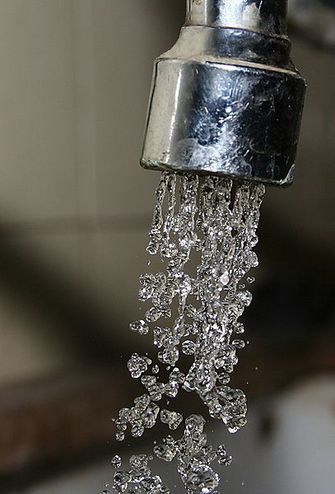


Please Don’t EAT All Our Water !?!

Not that I don't agree with this slogan, it is sure important to rationalize our consumption. However do we try to rationalize from the 10% or is it more logical to rationalize from the 70% of the sources of our water loss !?!
Let me explain...
First of all, I would like to say that many people are not aware of this problem, or in other words, it is a problem that has no "apparent" solution. The reason that triggered me actually to write today about this problem is that Egypt has just recently increased the designated area for wheat cultivation. Egypt is one of the biggest countries when it comes to rice and wheat consumption. Formerly, Egypt only cultivated a percent of its wheat's consumption and imported the rest. However, this year all the amount of wheat needed will be entirely cultivated, so this year for the first time Egypt will have self-sufficiency in wheat. On one hand, I am really proud of being able to be self-sufficient in wheat, as it is a strategic crop, but on the other hand, is that a wise decision?
Do you know much water it takes to cultivate wheat?
According to statistics; 1 pound of wheat consumes 110-250 gallons of water, in other words, annually wheat consumes around 790 billion cubic meters of water, by that wheat consumes 12 % of the overall agricultural water consumption!!!
I don't think that there is anyone on the planet, who is not aware of the water sacristy problem. And this awareness here ranges from trying - as much as possible - to rationalize using the abundantly available freshwater to actually dying from thirst. And unfortunately Egypt is more on the dry end of the scale. Egypt is one of the countries where a whole year may pass by and it wouldn't rain at all. Sure, there is the Nile River but we are already having trouble with our water share from it.
So how come we increase our consumption when our sources are the same or may be decreasing?
Now you may ask me, so if Egypt returned back to importing wheat, what will be the difference? Another country will consume the same amount of water to cultivate Egypt's wheat requirement?
And here my answer will be, you are absolutely right, but they will be using green water and not blue water as Egypt?
So what is meant by green and blue water?
As I just explained; in Egypt it almost doesn't rain so we completely rely on irrigation i.e. blue water, however, in other countries it rains a lot so they depend entirely on the rain water i.e. green water. So, we can import wheat from one of these countries.
Let's generalize this problem to a larger scale; do you know how much water is wasted every year for agricultural reasons?
Annually we eat 70% of our freshwater, in other words, 70% of freshwater are used for agricultural purposes mainly crop irrigation; i.e. blue water.
So, if Agricultural purposes consume about 70% of our annual water consumption, and domestic water consumes only 10%, how come we always hear about personal obligations to water rationalization, and no one speaks about water rationalization in agriculture.
Unfair isn't it !!!
Yes, we are literally eating away our freshwater!!!
But I guess it is always easy to ask people to close the tap when they are not using it, than asking the people not to eat vegetables, fruits and meat. Also almost all of us depend on these high-water consumption crops as rice, pasta, bread and vegetables. So how can we rationalize that... a dilemma isn't it??
So, what do you think, Egypt was right to take this decision or not?
Do you have any idea how could we rationalize eating away our freshwater?
.....................
Useful links:
http://www.fao.org/nr/water/docs/Summary_SynthesisBook.pdf
Image Credit: by Li-sung via Wikimedia Commons.

I think this decision should have been studied more precisely in terms of risk assessment as well as calculations to evaluate all the possible consquences .. not only out of an emotional burst to have total independence !!
I totally agree with you Marwa, it is a dilemma....Wheat is of stratigic importance but so is water...I don't know, I have been thinking about this decision for some time, yet I can't really decied whether it is a good or a rushed decision!?!
Thanks Doaa for the great post .. it's my 1st time to hear about the blue & green water .. you are also viewing the problem from a new prespective that I like very much ..
But to be honest I am really confused .. If I were to decide I am not sure whether I'll want to be able to produce the basic food to avoid political interference of other conteries in Egypt internal affairs or preserve the water as a trial to solve this expanding problem .. it's really a dilemma















